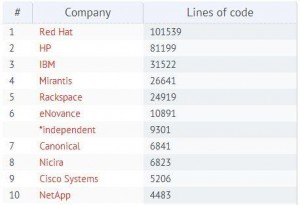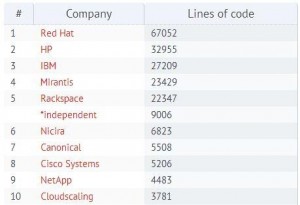5 Politically Incorrect Questions on OpenStack Contributions
1. Will Red Hat keep its top committer spot for Havana cycle?
Red Hat opens many of its OpenStack press releases with a tag line of “the largest contributor to OpenStack”, but will it be able to hold on to that #1 spot? At first glance Red Hat appears to be the uncontested leader (see figures below) in Havana contributions, but in actuality HP, which recently announced its own OpenStack distribution, is breathing down Red Hat’s neck. What gives Red Hat such an overwhelming lead is 29K lines of code that were merged into Horizon by Julie Pichon on May 7th. Most of these 29K lines were actually auto-generated and counting this commit towards Red Hat contributions is questionable.
 Core + Incubation as of 6/23/13 |  Only Core as of 6/23/13 |
2. What has the former AnsoLabs team been up to?
Most folks that follow OpenStack news probably remember that in July of last year all of Anso Labs (Nova founding team) has left Rackspace (presumably after their acquisition earn out was complete) and joined Nebula. At that time Nebula had become the top OpenStack committer. However, since then Russell Bryant of Red Hat has taken over the Nova PTL role from Vish Ishaya, while Nebula is now tracking as the #20 committer. I haven’t heart much PR buzz coming off them recently either. So what’s happening at Nebula, and what’s the former Anso Labs team focusing on? Did Nebula’s board whip Chris Kemp to re-focus all efforts on delivering the technology?
3. Can Canonical & SUSE keep a credible OpenStack play with so little upstream influence?
Upstream influence is what enterprises pay support dollars for when it comes to open source products. You want your vendor to have a large brain trust around the upstream code base and have the ability to quickly merge security patches they develop for you. It’s no coincidence that Red Hat, as the #1 contributor to the Linux kernel owns the vast majority of the Linux market. They understand the importance of upstream influence, hence their push for the #1 contributor title in OpenStack.
But how about Canonical and SUSE? With the #7 and #12 spots respectively, far behind Red Hat, IBM, HP, Rackspace etc., how likely are these guys to win enterprise support dollars for their distributions long term?
4. Has VMware lived up to its promise after joining the foundation?
There had been a lot of noise when I protested against accepting VMware into the OpenStack foundation. It was suggested that they’ll be contributing a lot of code and will help evangelize the community, far beyond just the money they put up in membership fees. Let’s do a check.
Despite Dan Wendlandt relinquishing his Quantum PTL spot to Mark McLain of Dreamhost, Nicira (tracked separately from VMware) continues to remain a solid contributor to Quantum. However, Nicira crew aside, I only see two commits by VMware so far to fix the vCenter driver in Havana. Would have liked to see more from such a large company… also, any OpenStack + vSphere case studies, anyone?
5. Who walks the talk among startup distros?
We have a lot of companies in the start-up arena innovating around OpenStack with their distributions or platforms. But do any of them contribute code to the project? It appears that only Cloudscaling (#11) walks the talk on contributions. Cloudscaling contributed more code towards Havana than Nebula (#20), Piston (#50), StackOps (#?), and Metacloud (#25) combined.
Any questions?
Before you bash my analysis as shortsighted, I want to mention right away that I DO understand that there are more ways to count contributions then lines of code. Yes, there are commits, reviews (coming in Stackalytics soon), general thought leadership on mailing list, evangelism etc. But when talking about pure code contributions, I’d argue that the number of lines merged is the best metric. If you disagree, suggest an alternative and we’ll track that.






